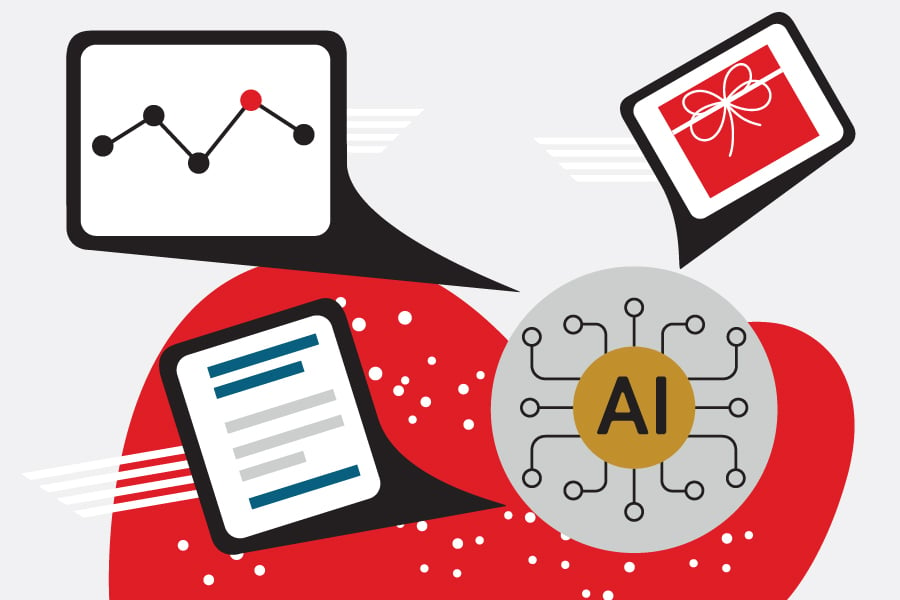Logistics
Warehousing & Fulfillment
Transportation
E-commerce
E-commerce Fulfillment Services
Lease & Maintenance
Semi Trucks
Supply Chain Technology
Logistics
E-commerce
Lease & Maintenance
Buy Used Trucks

The most wonderful time of the year is upon us - the holiday season!
For e-commerce brands, this season is vital for profitability and growth. In 2023, it's predicted that online holiday sales will reach between $278 - 284 billion. Brands who aren't on their A-game over the holidays will likely see a negative impact on their bottom line.
Not only is there an increased number of customers exploring new brands, but they're more willing to move quickly through the buying journey and click that 'purchase' button.
While decisive consumers may sound like a good thing, it can mean they're more likely to judge the experience and move on to another vendor faster than they normally would. For e-commerce brands, whether they provide an elevated experience can make or break their holiday sales.
Here's where AI comes in.
From customer support bots to personalized product recommendations - and everything in between - AI is going to be a huge factor in providing the best possible customer experience and boosting consumer confidence this holiday season.
AI is short for artificial intelligence and refers to technology that operates problem-solving and task completion in a similar manner to the human brain.
Essentially, AI mimics or 'thinks' like humans. Think, ChatGPT for Q&A + content generation, smart assistants like Siri or Alexa, or even Google Maps for monitoring traffic and road closures to provide optimal routes.
Consumers use and interact with AI daily, and in ways they may not even realize (i.e. AI-generated advertisements). But, the real question is - how does AI work?
In simple terms, AI technology is programed to 'learn' by processing vast amounts of data and identifying patterns that fuel their own decision making. AI does this through what's called 'machine learning' - an algorithm that uses historical data as an input to create new output.
For example, an AI system like a chatbot may 'learn' questions and responses by reviewing millions of examples of exchanges. This same system will also have the ability to improve over time as it goes through more real-time interactions.
While artificial intelligence can be complex, it has become a very normalized aspect of the shopping journey. Consumers everywhere have opted to use chatbots over calling a customer support line. Alternatively, they've submitted their information to an AI sizing tool to understand the best fit of a garment before purchasing.
AI can help e-commerce businesses:
While these are only a few of the ways AI can support an elevated customer experience, it's clear that companies who are consistently leveraging AI and creating more seamless customer journeys will fare better than those who aren't.
This holiday season, the retail industry is turning to generative AI to help enhance the shopping experience. Artificial intelligence is set to be a driving force this holiday season, with Salesforce predicting AI-driven product recommendations to drive $194 billion in online sales. In sum, retailers who don't embrace AI holiday shopping to help support their buyers' shopping journeys will fall behind those that do.
Product recommendations and fit
Generative AI technology can analyze a user's historical purchasing and browsing data to recommend relevant products, creating a customer-centric, personalized experience that boosts customer confidence in their purchase.
For example, Amazon's deal-finder targets highly-relevant items similar to the ones that you already may have sitting in your cart. For customers who aren't sure what to purchase, product recommendations may give them some inspiration and help them navigate the site.

Additionally, once a customer has identified a product they'd like to purchase, an AI sizing solution can be implemented to ensure that they purchase the best fit. Whether the technology compares their brand to another brand's sizing or virtually scans the customer and creates a digital 'twin' - shoppers may feel more confident in purchasing multiple products with little chance of having to return or exchange due to incorrect sizing.
Customer support bots
While human interaction is always a plus in customer support operations, many consumers are turning to AI-driven chatbots in order to cut down the time spent waiting for support. When brands provide a customer support bot as an option, customers can come to quicker resolutions without having to wait for email responses or an available phone agent.
Depending on the brand's approach, chatbots can be programmed to facilitate a gamut of features like initiating returns, order tracking, or even product questions. Beauty brand Sephora's virtual artist and assistant chatbots can help customers to reserve appointments - or find the perfect color lipstick.

During the holidays, this is vital for customers who are frantically searching for the perfect gift or want to make sure their order will arrive on time without having to hop on a phone call or email thread. Plus, chatbots available 24/7 365 days out of the year, something you can't always pull off when only using full-time associates.
Content creation and advertising
While traditional marketing often relies on a team of copywriters to produce compelling content and create digital campaigns, many retailers are turning to AI tools this holiday season. From product descriptions to social copy, AI can help generate content in no time with a few quick instructions. Additionally, AI tools are no stranger to helping optimize digital campaign performance.
In fact, Google recently rolled out its AI-powered ad solutions this year, helping retailers optimize their digital ad campaigns.

It's important to note that while generative AI can certainly help inspire copywriters and marketers, it almost always needs a set (or a few sets!) of human eyes to edit, optimize, and monitor.
Customer sentiment analysis
Customer satisfaction is the cornerstone of a successful e-commerce business. But it's not always easy to measure. There are feedback surveys and NPS scores, but these practices take time to gather and organize the data.
Imagine this: your company is spearheading a major cyber week sale on a newly launched product, and the reviews are coming in at full speed and through a multitude of channels (social, Google, site, etc.). So much so that your customer support team is having trouble keeping up with manually sorting reviews to understand sentiment.
This is where AI can help! Instead of having a team dedicated to analyzing reviews, AI tools can quickly comb through customer data in a matter of minutes, using machine learning algorithms to indicate positive and negative sentiment, identify patterns, and respond to issues in real-time no matter the channel. The results? Valuable insights for data-driven decision-making.
Detect suspicious return activity
With the holiday shopping season, there also comes a peak in returns. However, retailers will need to be extra-vigilant in monitoring their return activity to make sure that consumers aren't taking advantage of their brand. One way to eliminate return fraud? You guessed it - artificial intelligence.
Retailers can leverage AI algorithms to detect suspicious return activity like serial returns or false order claims. From there, AI can actually suggest resolutions for the brand in real-time. For example, a serial returner may be identified by an AI tool and issued a warning that they will only be able to make one more return within the year.
Because AI can handle analyze at scale, retailers who leverage generative AI tools within their returns will be much better equipped to identify and stop fraud at scale.
Demand forecasting
One thing that all holiday shoppers want is confidence that their favorite products will be in stock and that their packages will arrive on time. Brands who aren't meeting these expectations are much more likely to lose customers to competitors - especially over the holidays when shoppers are looking for the best deal and the most seamless journey.
To meet these baseline expectations, brands will need to ensure an efficient, error-free demand planning strategy - which takes plenty of time when done manually. The good news is that with the help of AI-driven forecasting, companies can reduce errors by 20 - 50% - resulting in more sales and happier customers.
From analyzing historical sales data to identifying advertisement engagement, artificial intelligence enables retailers to predict inventory needs and stay away from any sort of 'just-in-case' method.
In fact, many retailers are already adopting AI for demand planning this holiday season. Popular apparel brand Urban Outfitters recently implemented O9's AI-based merchandise planning platform to detect holiday shopping patterns and shifts and enable real-time, data-driven decisions that optimize inventory costs and performance.
Fulfillment operations
Last but certainly not least, AI will be a transformative tool for e-commerce brands' fulfillment operations.
Generative AI can help optimize warehouse operations by calculating the most efficient picking routes for associates while identifying optimal storage areas for fast-moving SKUs. Similarly, it can track inventory availability so that customers on the site can see product numbers in real-time.
Not only this, but AI can also detect the most streamlined 'last mile,' ensuring a customer's package makes it to their doorstep in a timely manner. Plus, AI can predict maintenance needs, helping avoid any blackouts within the warehouse where fulfillment machinery must be fixed.
All of the above can be done manually - but with AI's ability to scale rapidly, brands who implement it within their fulfillment operation will be cutting massive amounts of manpower out of the equation.
While it is an incredibly helpful tool during the holiday shopping season, AI is quickly becoming a vital part of the retail industry in every season.
From fulfillment optimization to sizing solutions to marketing content, there are a plethora of ways that brands can utilize this new technology. And, those brands that choose to stay ahead of the curve and invest in AI soon rather than later will surely stand out in an overly-saturated market.
No matter the season, AI enables businesses to streamline the customer experience, boost satisfaction, cut operational costs, and build a truly seamless end-to-end shopping journey. One that customers will adore this holiday season.